“The time of risk takers has come”
The Day’s roundtable on the “temperature” of today: diagnosis and prescriptions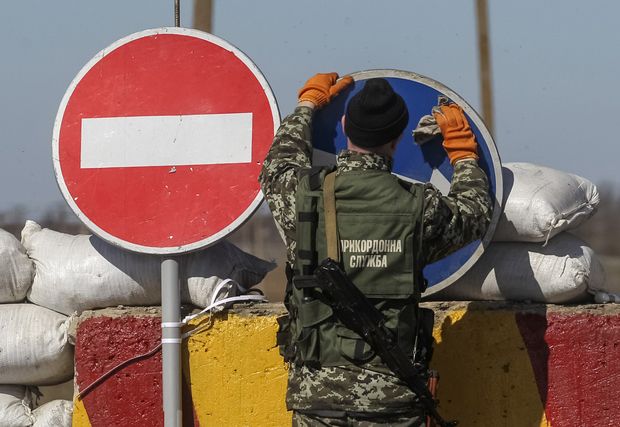
Russia’s occupation of Crimea became possible for a number of reasons. One of the key factors is inability or unwillingness of the current government to make contact with and, what is more, heed security professionals and experts. Unlike the Ukrainian leaders, their Western counterparts know this rule very well. The NATO leadership recently invited some top Ukrainian security and defense experts to the Alliance’s headquarters in Brussels to discuss the current situation in Ukraine and a plan of further action.
What are the results of these NATO debates? Why were the Kyiv authorities unable to defend Crimea? Have any conclusions been drawn? What threats is Ukraine facing now? How should this country respond to dangerous tendencies? This was the subject of a debate at The Day’s roundtable, “The ‘Temperature’ of Today: Diagnosis and Prescription,” with the experts who had visited Brussels. Among the roundtable participants were ex-prime minister of Ukraine Yevhen Marchuk, ex-security chief Ihor Smeshko, ex-first deputy chief of the General Staff of Ukraine’s Armed Forces Ihor Kabanenko, and ex-foreign minister Volodymyr Ohryzko.
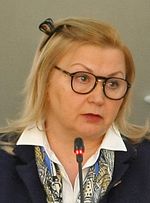 Larysa IVSHYNA: “These days are very significant for our country. Medical terminology in the roundtable’s name looks natural, for we all know that the disease has long been coming to a head.
Larysa IVSHYNA: “These days are very significant for our country. Medical terminology in the roundtable’s name looks natural, for we all know that the disease has long been coming to a head.
At the same time, the current acute crisis is not only a moment to feel all the pain, but also a chance to recover completely – if, of course, there are high-skilled doctors, a right diagnosis, and a correct prescription.
Our country has been reminding me for almost 20 years of a patient on the surgical table, who was ‘warmed up’ instead of being ‘frozen.’ It also looked very often as if the patient was surrounded by shamans who reaped a benefit from this and kept professional doctors at bay.
To begin with, I would ask you, dear experts, to speak on the results of your recent top-level discussions in Brussels.”
IHOR SMESHKO: “NO OTHER COUNTRY INVESTED IN U.S. SECURITY MORE THAN UKRAINE DID”
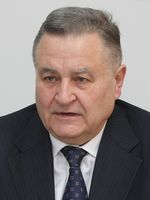 Yevhen MARCHUK: “We were all invited to the NATO headquarters not as officials but as experts in our domain and carriers of concentrated information. It was clear that the Alliance representatives either did not have complete information about the real state of affairs in Ukraine’s military sphere or were trying out a certain algorithm of their reaction and wanted to hear expert opinions. The meeting was useful for both sides. We heard very much of what we could only guess, and we are sure they also heard what they could have never heard from Ukrainian governmental bodies. It was a very heated, frank, and manlike conversation without media people being present or a protocol being observed.
Yevhen MARCHUK: “We were all invited to the NATO headquarters not as officials but as experts in our domain and carriers of concentrated information. It was clear that the Alliance representatives either did not have complete information about the real state of affairs in Ukraine’s military sphere or were trying out a certain algorithm of their reaction and wanted to hear expert opinions. The meeting was useful for both sides. We heard very much of what we could only guess, and we are sure they also heard what they could have never heard from Ukrainian governmental bodies. It was a very heated, frank, and manlike conversation without media people being present or a protocol being observed.
“Undoubtedly, we emphasized and focused our attention on the following issue. Having given up its nuclear potential in 1994, Ukraine has fulfilled its obligations, but the Budapest Memorandum guarantors have failed to fulfill the obligations they assumed. Specialists know that the whole nuclear potential based on the territory of Ukraine (each missile carried ‘300 Hiroshimas’) was targeted on the United States. Ukraine thus played a crucial role in strengthening US security. Speaking to NATO representatives, we built our arguments and sometimes even criticisms on this basis – we have solved your problems, but now that we are facing a military threat, you are saying you lack a mechanism to help us. Much to their credit, they showed understanding of this.
“The discussion was friendly and constructive. It seems to us that NATO will take into account a lot of what we talked about when it comes to modifying its attitude to the Ukraine situation.”
L.I.: “Mr. Smeshko, will the NATO discussion help our security?”
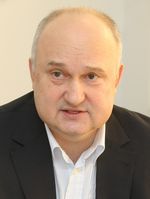 Ihor SMESHKO: “About two years ago, when The Day asked me if Ukraine had friends, I had to say no. We had friends neither in the East nor in the West. Only now, in these dramatic days for our state and people, is Ukraine winning its first friends in the West. I would single out Canada which is setting an example. Instead, the US government is taking absolutely inadequate steps. I said this when we were meeting the NATO first deputy secretary general. Throughout the US history, no other country invested in the defense of the American state more than Ukraine did when it renounced nuclear arms. I’d like to remind you that a salvo of those weapons could make the American state cease to exist.
Ihor SMESHKO: “About two years ago, when The Day asked me if Ukraine had friends, I had to say no. We had friends neither in the East nor in the West. Only now, in these dramatic days for our state and people, is Ukraine winning its first friends in the West. I would single out Canada which is setting an example. Instead, the US government is taking absolutely inadequate steps. I said this when we were meeting the NATO first deputy secretary general. Throughout the US history, no other country invested in the defense of the American state more than Ukraine did when it renounced nuclear arms. I’d like to remind you that a salvo of those weapons could make the American state cease to exist.
“Undoubtedly, we must be realists – help is only given to those who resist and are ready to show that they are capable of defending themselves. My impression is that NATO is consoling itself with the opinion that they have done all they could do for a non-member country. Yet we have no other ally now. All we have to do now is reform the Armed Forces of Ukraine. This can only be done if the latter are run by high-class professionals. The latest reappointment of the acting minister of defense also surprises me because, for example, here is an admiral next to me who is, with due account of his professional training, the most suitable figure for this office at present. But the government still keeps him unused. We must defend ourselves and show tough self-control. Otherwise, our inaction will only provoke the aggressor to take further steps.”
L.I.: “Mr. Kabanenko, you recently unearthed an intelligence report in Sevastopol that the Yanukovych team had dismissed you from the Armed Forces. But now there are questions to the leadership that has come to power owing to the revolution and does not know what and how to do. We can see your daily Facebook posts, and it is good that the public can read specialist commentaries. But what is the leaders’ reaction? Do you feel their hot reaction to your specialist recommendations?”
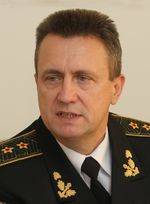 Ihor KABANENKO: “We classify what is now going on in Ukraine, from the viewpoint of military strategy, as war and aggression. There are no direct armed clashes so far, but the available data show that the likelihood of such clashes is very high. What did the Russian troops begin with well before the active phase of the conflict? On seizing the oceanarium, they identified the buoy-stopping equipment in a very crude way and in fact destroyed it. This was a serious indicator of the danger of their further actions. Of course, this was all done illegitimately in contravention of all the international norms. The Russians had been preparing for a long time and purposefully for what then occurred in Crimea.
Ihor KABANENKO: “We classify what is now going on in Ukraine, from the viewpoint of military strategy, as war and aggression. There are no direct armed clashes so far, but the available data show that the likelihood of such clashes is very high. What did the Russian troops begin with well before the active phase of the conflict? On seizing the oceanarium, they identified the buoy-stopping equipment in a very crude way and in fact destroyed it. This was a serious indicator of the danger of their further actions. Of course, this was all done illegitimately in contravention of all the international norms. The Russians had been preparing for a long time and purposefully for what then occurred in Crimea.
“Look at the lessons Britain learned from the Falklands conflict, even though it won. A thorough inquiry was made into the way the forces performed and why there were human and material losses (a guided-missile destroyer and other ships). As a result, the British revised the entire shipbuilding program and changed approaches to their armed forces. This was done to prevent similar things from happening again. We should also find out why it happened so in Crimea. This should be a matter of national investigation so that humiliating events like this never occur again.
“Russia is now maneuvering and looking for weak spots in order to engage its troops concentrated on our borders. They are really mighty – we receive information every day about military buildup. For example, what is the purpose of Uragan multiple rocket launchers in Crimea or of SU 24 bombers whose radius surpasses the territory of our state? Or what is the purpose of training an airborne force to execute 500- km-deep missions? These indicators are to be reckoned with. We must know for sure that Russia’s leadership will not stop, but they will be advancing as long as we allow them to. We are fully capable of containing the Russians at the initial stage and, if there is an all-out aggression, of stopping them. What matters in this case is political will and decisiveness.
“It is now the time of risk takers, the people who can take actions commensurate with the risk. In other words, they will do their best to neutralize and localize the situation, pursuing a preemptive tactic. Unfortunately, we can see that minimizing risks is the preferable approach today, but this is of a very high cost for us – Crimea is occupied. The approach and strategy must be radically changed now. Knowing Putin’s strategy, we must foil it with our counterstrategy, one that can work at the local level, at the level of separatist-prone regions. It is important to take actions in response. On the other hand, we must have a ‘shield’ which will keep the enemy from fulfilling his plans in case our border has been broken through. In other words, there should be a two-pronged strategy with clear-cut tactical and operational measures.”
Ihor KABANENKO: “HALF MEASURES WILL ONLY PROVOKE THE AGGRESSOR”
L.I.: “Society is all alarmed, which you can feel in social networking sites and on the street. At the same time, society is prepared for concrete actions: our people have remitted over 60 million hryvnias to the army. On the other hand, we have a government which I would not like to criticize when the ‘brother’ is at the door. But, unfortunately, we are falling hostage to their policy of surrender and non-professionalism. So when we overcome the difficulties, there is bound to be a straight talk with the authorities. Still, is there anybody whose professional hand you can feel and, if not, how can this government be helped?”
I.K.: “The grassroots energy is very strong. I receive a huge number of calls, SMS, and Facebook messages; I meet a lot of people. The people are saying: we need nothing, and we only want to defend our state. In this situation, I would suggest that the government join efforts ‘from above’ with the grassroots energy. There are absolutely legitimate mechanisms to do so. They are not confined to partial mobilization only. There must be a central coordinative body known as General Headquarters. The experience of all countries shows that this body helps make a joint war effort.
“On the other hand, it is indispensable to take clear-cut military steps, such as establishing no-fly zones and imposing, wherever necessary, a state of emergency… The military should work in the conditions when the state makes use of certain instruments provided for by the law. Another question is to form territorial defense units and to order a general mobilization which will allow activating the entire defense capacity to protect the country. Why is all this not being brought into full motion? This is a mystery for me. Instead, the half measures the government is taking today will only provoke the aggressor to take further actions. I hope the government will take these steps at last because every minute, or even second, is worth a lot.
“We have already seen the way the Russian side resorted to strategic deception measurers in Chechnya and Georgia. It is an absolutely ‘normal’ approach for them. On the one hand, they are assuring us that everything will be OK but, on the other, they are doing totally opposite things. We must understand that the Kremlin must not be trusted. I am saying it again: we are potentially capable of defending our state. But this potential should be converted into a real possibility to accomplish the required missions.”
L.I.: “Our conversation ‘kills’ the alibi of those who say they have never known or heard this.”
I.K.: “I have suggested a lot of things to our General Staff, including a possibility to unblock Lake Donuzlav. This was really possible. Why was this not done? It is a big question for me. I hope adequate steps will be taken further on and we will be able to use the experience of the people who really know about all these things. I am convinced that it is impossible to defeat us, a great nation. But this raises the question of the price of this victory. I wish the price would be minimal.”
Volodymyr OHRYZKO: “RUSSIA HAS FOUND A LOT OF WAYS TO INFLUENCE THE WEST’S BRAINS”
L.I.: “Mr. Ohryzko, what do you think about the NATO headquarters discussion? You know very well that we twice came closely to the Membership Action Plan (MAP) but, due to certain internal and external factors (insufficient drive of the people in charge of this and a meeting of Putin, Sarkozy, and Merkel on the eve of the summit, respectively), we, as well as Georgia, failed to seize this opportunity. Instead, Georgia was given a war. Has Ukrainian diplomacy learned any lessons?”
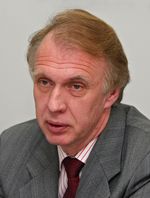 Volodymyr OHRYZKO: “I will say frankly that, as both a professional diplomat and a citizen, I liked the NATO discussion because we managed at last to put across – clearly, calmly, and convincingly – the things that worry everybody. It is not only about Crimea, but also about the world order system which will either exist or be ruined completely. The world has been living for 69 years by the rules that were adopted for all to obey, and suddenly a country, which is a UN Security Council member and, hence, responsible for peace in the world, shamefully, brazenly, and brutally tramples on this order with a military jackboot.
Volodymyr OHRYZKO: “I will say frankly that, as both a professional diplomat and a citizen, I liked the NATO discussion because we managed at last to put across – clearly, calmly, and convincingly – the things that worry everybody. It is not only about Crimea, but also about the world order system which will either exist or be ruined completely. The world has been living for 69 years by the rules that were adopted for all to obey, and suddenly a country, which is a UN Security Council member and, hence, responsible for peace in the world, shamefully, brazenly, and brutally tramples on this order with a military jackboot.
“It seems to me that our visit helped NATO understand what Russia really is. For the West seems to be in thrall of political fantasies about Russia against the backdrop of obvious gas-related corruption. If a former German chancellor is officially on Gazprom’s service, what else can be said? I recently found an interesting initiative in the Internet: the Germans have caught a Der Spiegel journalist who has been on Moscow’s payroll for about 10 years. A public campaign is underway to collect 5,000 signatures to make the journal’s editorial board officially comment on why it recruits such ‘high-class’ specialists.
“Unfortunately, Russia has found very many ways to influence the brains of the Western public and decision-makers.”
L.I.: “A way to turn money against capitalism…”
V.O.: “An absolutely right characteristic. Secondly, we put across them a simple truth: if you assume a responsibility, you must exercise it. We said: dear friends, you are just not bearing your responsibilities. For example, there was recently an EU-US summit I had been looking forward to. I will say frankly that I am disappointed with Obama’s speech. Yet, judging by the dynamics, he has begun to react rather intensively and adequately in the past two weeks to what is going on in Ukraine. But they still failed to reach the required level of responsibility.
“It is very important for Ukraine now to show as much activity – aggressive political, rather than diplomatic – as possible in foreign affairs. Like my colleagues, I have a lot of questions to our government. If you open the international law manual for 3rd-year students at the Institute of Foreign Relations, you will see written there: whenever your country is an object of aggression, the first thing to do is to break off diplomatic relations. You cannot possibly maintain relations with the aggressor that has seized a part of your territory. Sanctions are imposed, too. Thirty three countries have already imposed sanctions on Russia, but we continue to trade with it, catering for their space systems, nuclear weapons, etc.
“What is this? An active civic stand, to quote a phrase of the past? I don’t think so. This prompts me to draw very unpleasant conclusions. I don’t want to speak of this now, but…”
L.I.: “But will there be more time for discussions? Well-known military experts are warning about serious dangers to our country.”
V.O.: “It is absolutely clear that we should urgently apply for a MAP. But I must tell you, my dear colleagues, that we failed to receive a MAP in 2008 for the simple reason that one component part of the governmental coalition not only disliked this plan, but was doing its best for us not to receive it. And since I was one of those who were actively seeking a MAP, they found a good pretext to dismiss me. Now we must raise, in no uncertain terms, the question about the MAP and, later, NATO membership. Pending this, we should demand, not ask, that the US conclude with us a bilateral agreement that will guarantee our security interests. You can’t do this within the NATO framework? Do it as part of bilateral relations. The same about the UK and France: did you sign the Budapest Memorandum, did you take on responsibility? Please exercise it!”
Larysa IVSHYNA: “DO NOT BROADCAST ENEMIES AND THEIR STATEMENTS. PLURALISM COMES TO AN END WHEN THE COUNTRY’S DEFENSE IS AT STAKE”
L.I.: “Our newspaper has been supporting and popularizing the idea of NATO in all these years. We are staunchly on the side of those forces in Ukrainian society – even if they are not represented in parliament or the Cabinet – which view Ukraine as a future Alliance member. But British and American gentlemen, whom we have already presented with a big gift in the shape of security and who care so much about their reputation, should now take a right step for Ukraine instead of expecting Ukrainians to make a wise choice in the presidential or parliamentary elections. Our society has too little time to reconsider the situation and ensure a peaceful life, development, and security. Journalists should also understand the situation and create a suitable environment. For example, many websites place the news that the US intelligence reports a high probability of Russian intervention into eastern Ukraine on the ‘tenth position,’ while the first line is about ‘who said what to whom.’ All news rooms should be filled with the most burning news items, and all journalists should be aware of the world they are living in. Do not broadcast enemies and their statements. Pluralism comes to an end when the country’s defense is at stake.”
I.K.: “What is very important in this context is a close, frank and truthful communication between the authorities and the people. Everybody must understand that we have crossed the Rubicon. Society has now entered a state of war. Unfortunately, people have not yet fully understood the danger of the current situation. A part of society is reacting adequately – they express readiness to defend the state and confirm their choice of civilization. But there is also another part which still lingers in the realm of peaceful illusions. It is the government that must do its best for people to understand the level of real danger – also by the efforts of media facilities. I agree that the media should bear in mind that they are working today either for or against our victory. There is no third option. Naturally, the government should be prepared for this kind of communication and remain in touch with the community not only by way of statements, but also via normal full-fledged press conferences, debates, articles, and public speeches. Only then can the result be achieved.”
Ye.M.: “There is sector in scientific psychology known as victimology. It is when, during a conflict, the weakness of one participant provokes the other one to commit a crime. It was reasonable not to provoke Russia for a conflict when there was no invasion. We have a weaker military balance. But when the Russians began military exercises near our borders, we might as well have begun non-provoking exercises of our own. This would have allowed us to reinforce the Kerch ferry route, the key military installations, and control headquarters, to organize evacuation of the servicemen’s families. For what is an exercise? It is a war game. But nothing of the kind was done.
“When we told a top NATO functionary that the instructions not to provoke were not exactly adequate, he said to us frankly: ‘We advised your leadership not to provoke, but we never told you not to defend yourselves. We did not stay in your trenches and we didn’t see what was going on around you.’ Our side must have thought that not to provoke meant to stand still like calves. As a result, we have what we have.
“On the other hand, I would like to support my colleagues. Not only CNN, but also many other channels quoted US intelligence services as saying that the situation was being aggravated. But where is a statement of the Ukrainian leadership in this connection? It is not just a journalist’s information. We can presume that similar information also came to our governmental bodies. Where is the government’s statement on this? All the more so that we know what is going on near the borders today.
“Society must feel that the government controls the situation and cares about its citizens. A very serious military threat is hanging over this country. But things look quite good from the angle of official institutions. The foreign ministry has insufficient information about the state of affairs on the Russian-Ukrainian border.
“And the freed Mamchur? Journalists should have welcomed him as a national hero in half-day-long radio and TV reports – not because he deserves this as a serviceman but in order to raise the morale of our army. Does this really need any special recommendations?”
Newspaper output №:
№23, (2014)Section
Economy





